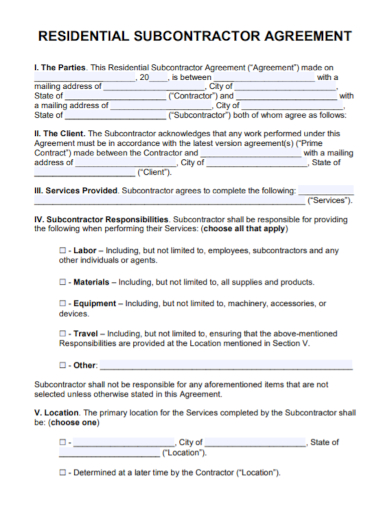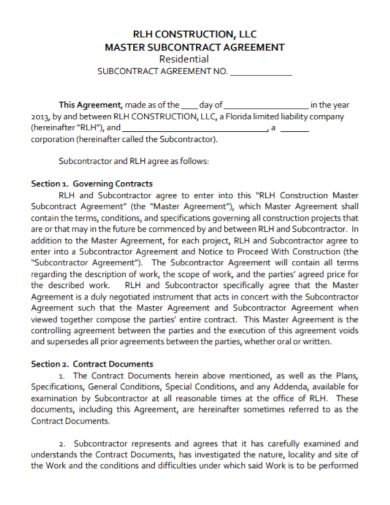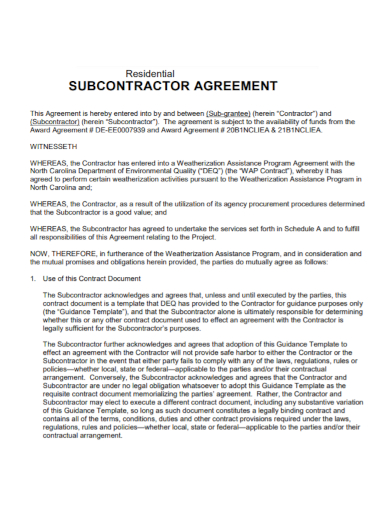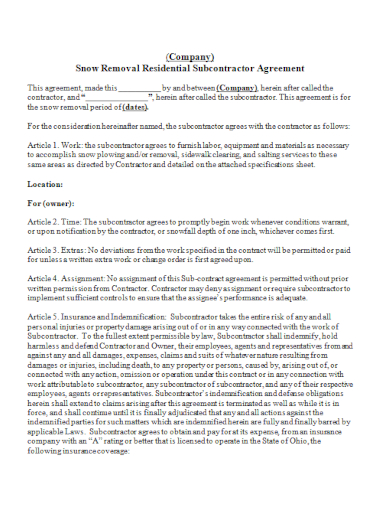Using contracts to protect your financial and legal rights when hiring a subcontractor can be extremely beneficial. Hiring subcontractors to complete a portion of another’s work is a common practice in the construction industry. A graphic designer, for example, might hire a writer to write the text for a brochure that they’re putting together for their client. Working as a subcontractor is possible for nearly any type of company or profession. When it comes to your agreement’s terms and conditions, a contract can be used to explain and clarify everything, from the scope of the assignment to deadlines and payment arrangements, to name a few examples.
The use of a subcontractor agreement may appear to be a technique for contractors to protect themselves rather than subcontractors; yet, in some cases, subcontractors may gain from the use of a subcontractor agreement rather than contractors. These are the official written documents that specify the work to be done, the timetable, and any other critical components that must be taken into consideration during the building process. When subcontractors are aware of all of these components, they can better defend themselves by being able to demonstrate that they did what the contractor or owner expected them to do. A thorough evaluation of their subcontractor agreements, as well as a refusal to accept needless risk in their subcontractor agreements, can help subcontractors avoid some of the more damaging restrictions in their subcontractor agreements. Furthermore, the subcontractor agreement enables subcontractors to exercise their rights and increase the efficiency of their firms’ operations by providing them with a framework for doing so. Our sample residential subcontractor agreements are provided to serve as a starting point for you to use as a template while creating your own. After you’ve familiarized yourself with the document, feel free to use these samples as recommendations or even templates to assist you with the entire writing process, including how the document appears and functions in different situations and situations.
3+ Residential Subcontractor Agreement Samples
1. Residential Subcontractor Agreement
2. Residential Construction Subcontractor Agreement
3. Sample Residential Subcontractor Agreement
4. Company Residential Subcontractor Agreement
What Is a Residential Subcontractor Agreement?
A subcontractor agreement is a contract between a contractor or project manager and a subcontractor that is used in the construction industry to define the scope of work. This demonstrates that all parties have achieved a mutually beneficial agreement and that the assignment will be successfully completed. Subcontractors should properly analyze the subcontractor agreement and ensure that all obligations are completed in order to prevent putting themselves at unnecessary danger. Numerous subcontractor agreements contain specifics on the project’s duration, scope of work, communication routes, and even payment terms, all of which are outlined in great detail. Pay when paid or pay if paid are words that are used in certain agreements to define when a subcontractor is rewarded and when they are not. Other subcontractor agreements, on the other hand, are fairly balanced in their treatment of both contractors and subcontractors. Subcontractor agreements, depending on the provisions of the agreement, may be more advantageous to subcontractors than typical verbal agreements in some situations. The major corporation may be responsible for the upkeep of the government agency’s commercial premises if a government agency enters into a contract with the large firm. The upkeep of each location may be contracted out to a subcontractor by the large corporation. A result of this is that the subcontractor performs the maintenance services, and the large corporation makes money by charging the government department for those services at a greater rate than the government department initially paid the subcontractor. Individuals, businesses, and non-profit organizations are all eligible to work as subcontractors for the government.
How To Write a Residential Subcontractor Agreement
While a subcontractor agreement may appear to benefit contractors rather than subcontractors, it is possible that subcontractors will really gain from the arrangement. As the name implies, this is a formal written document that outlines the work to be completed as well as the anticipated completion date as well as other key things to consider throughout the construction process. Subcontractors can protect themselves by demonstrating what the contractor or owner was supposed to perform, if they are aware of all of the relevant information and figures. A thorough assessment of the clauses in their subcontractor agreements, as well as a refusal to take needless risks, can help subcontractors avoid some of the more onerous provisions in their subcontractor agreements. Additionally, subcontractors can utilize the subcontractor agreement to exercise their rights and enhance the operations of their own businesses, among other things. A subcontractor agreement should have a slew of important clauses that must be followed. Subcontractors should be aware of a few important factors as well. Listed below are the variables that have the potential to influence the agreement, either positively or adversely.
- Scope of work
When you hire a subcontractor, make sure that the scope of work is set out in the agreement that you sign. The scope of work is the list of tasks that a subcontractor is supposed to do. It can be hard to agree on a wide range of work, and subcontractors may not be able to meet deadlines. Assuming that a subcontractor didn’t do the project’s work is easy when a task isn’t written down in full As a result, it is important to have a well-defined set of tasks. - Supply Chain
Another important thing to think about when you sign a subcontractor agreement is how much risk there is in the supply chain and other operational issues. The subcontractor doesn’t always have complete control over the owner’s supply chain or commodities. In these cases, the subcontractor shouldn’t be held responsible for the owner. Some contracts, on the other hand, are meant to pass the risk on to subcontractors. Managing supply chain risk can be as simple as reading and agreeing to the subcontractor agreement, which can be done quickly. - Defense & Indemnification
They use the words “defense,” “insurance,” and “subcontractor agreements” a lot, and they’re used a lot. If you work on a project with a contractor, you’re likely to get a defense and indemnity clause. These criteria, on the other hand, can sometimes put the subcontractor under too much stress. Some states have passed laws to protect subcontractors from unfair indemnity provisions in contract documents. In addition, other states have passed laws to make sure that they don’t pay out too much money. Subcontractors should include defense and indemnification clauses in their subcontractor agreements with each other. - Insurance, Bonds, & Liens
Contracts with subcontractors may include clauses about subcontractor insurance, liens, and bonds, as well as other things. All subcontractors should be told about the insurance and bond requirements for their job. However, it is possible that the subcontractor agreement will say that the subcontractor can’t file a lien. Subcontractors can’t file a mechanic’s lien if they don’t get paid on time or don’t get paid at all. - Warranty
The work guarantee in a subcontractor agreement may be different for each project, but this is project-specific. This contract clause helps the contractor, but it may also help the subcontractor. If a subcontractor’s work is good and well documented, his or her reputation will be good. If an accident happens and something goes wrong, the subcontractor can deal with it and keep their good name. - Arbitration
Subcontractor agreements usually have arbitration clauses in them. It’s not the same for subcontractors. They must go through binding arbitration instead of a court of law with any claims. As a result, subcontractors will not be able to go to court for problems with their contracts. A subcontractor may or may not be an issue for your business, but it’s something to think about when hiring one. - Conditional Payment
Contractual terms that require payment only if work is done are becoming more common in subcontractor agreements. Make sure you pay before you make a payment by saying Pay if you pay and Pay when paid. Because of this, subcontractors may not get paid on time, or they may not get paid at all. Before subcontractors sign their contract, they must be aware of this clause. Otherwise, they could lose their work.
FAQs
Who is responsible for a contractor?
It’s becoming more common for subcontractor agreements to include terms that require payment only if the work is done. People who make payment arrangements that depend on getting paid use words like “Pay if paid” and “Pay when paid.” Because of this, subcontractors may not get paid for their work for a long time or not at all. It is important for subcontractors to know about this clause before they sign their contract. Otherwise, they could lose their work.
Does a subcontractor have to give notice?
If you are hiring someone else to do electrical work or build a fence, you must follow the main contractor’s instructions. Two weeks’ notice is the norm.
What are contract documents?
There are a lot of documents that make up the tender and acceptance process. These are the tender documents: designs and drawings; specifications; a schedule of quantities and rates; a letter of acceptance; and any agreed-upon changes.
Employee and subcontractor are not the same thing. Subcontractors are people who work for themselves and don’t work for the contractor. They work on their own and decide how their jobs are done. It’s not always easy to tell the difference between an employee and a subcontractor. If the subcontractor is an employee, the contractor’s responsibilities change (such as payment of superannuation contributions). The legal rights and responsibilities of a subcontractor are not the same as those of an employee.
Related Posts
FREE 10+ Trial Agreement Samples In MS Word | Google Docs | Apple Pages | PDF
FREE 9+ Shop Rental Agreement Samples [ Commercial, Lease, Tenancy ]
FREE 10+ Charter Agreement Samples In MS Word | Google Docs | Apple Pages | PDF
FREE 10+ Mentoring Agreement Samples In MS Word | Apple Pages | PDF
FREE 10+ Partner Agreement Samples In MS Word | Google Docs | Apple Pages | PDF
FREE 10+ Individual Agreement Samples In MS Word | Google Docs | Apple Pages | PDF
FREE 10+ Strategic Agreement Samples In MS Word | Google Docs | Apple Pages | PDF
FREE 10+ Equity Agreement Samples In MS Word | Google Docs | Apple Pages | PDF
FREE 10+ Producer Agreement Samples in MS Word | Apple Pages | PDF
FREE 10+ Grant Agreement Samples In MS Word | Apple Pages | PDF
FREE 8+ Meeting Agreement Samples in MS Word | Google Docs | Apple Pages | PDF
FREE 10+ Community Agreement Samples In MS Word | Google Docs | PDF
FREE 8+ Real Estate Option Agreement Samples in MS Word | PDF
FREE 10+ Call Option Agreement Samples In MS Word | PDF
FREE 10+ Advertising Agreement Samples In MS Word | Google Docs | Apple Pages | PDF




